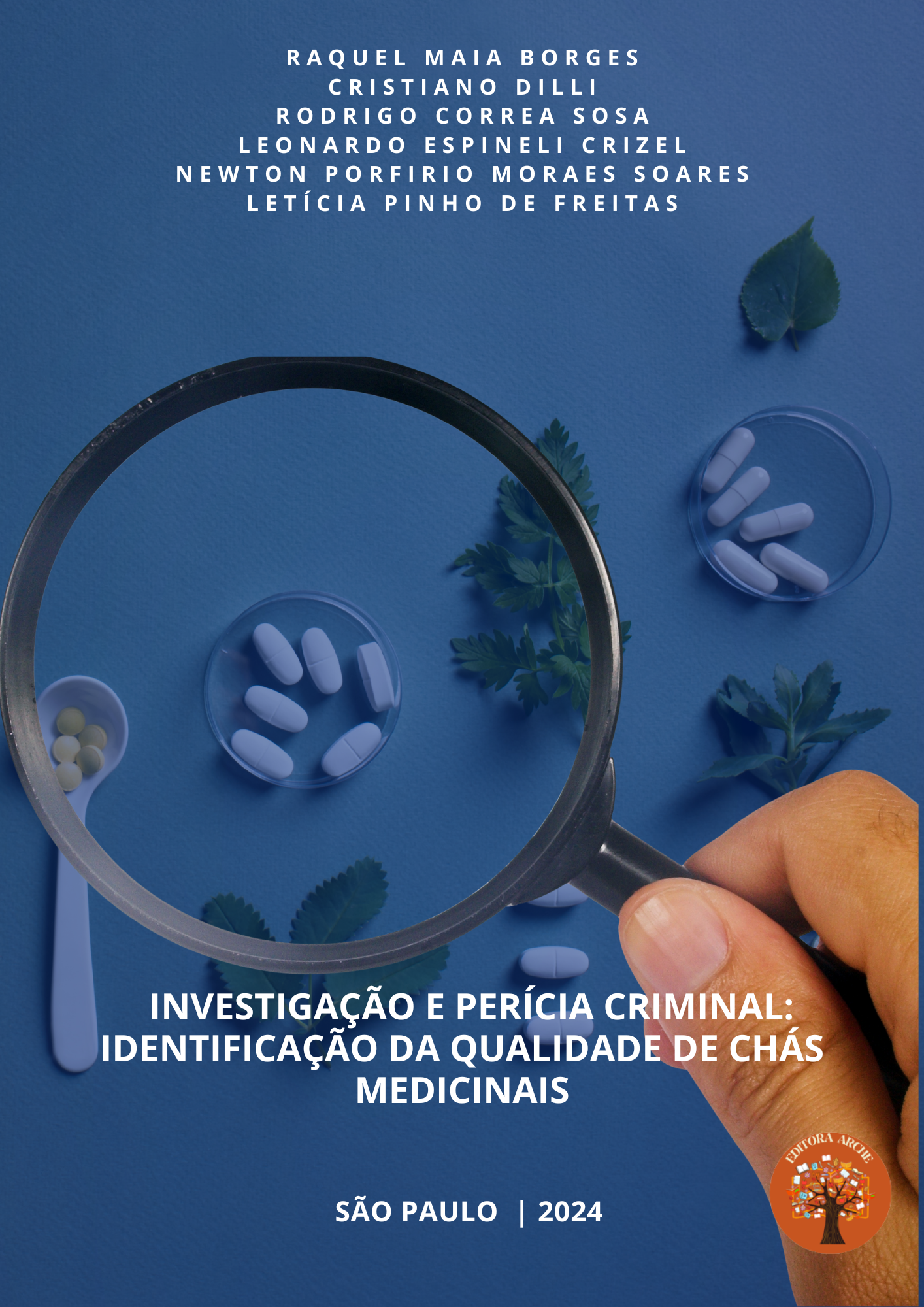CRIMINAL INVESTIGATION AND FORENSICS: IDENTIFICATION OF THE QUALITY OF MEDICINAL TEAS
Keywords:
Criminalistics. Toxicology. Forensic Expertise. Medicinal Teas.Abstract
Criminal investigation and forensics are areas of increasing relevance and sophistication in the context of forensic science. Within these disciplines, the analysis of natural substances, such as medicinal teas, has become a crucial tool for ensuring the safety and authenticity of products sold and consumed. Although the use of medicinal plants dates back centuries, the demand for superior quality natural products has never been greater than it is today, driven by a growing market and a collective awareness that values health and well-being.
This book, Criminal Investigation and Forensics: Identifying the Quality of Medicinal Teas, was designed with the aim of offering a detailed and multidisciplinary analysis of the investigative methods applied to the identification and certification of the quality of medicinal teas. In it, we combine concepts and practices from criminalistics, phytotherapy, pharmacognosy and biology, presenting an innovative and rigorous approach to the evaluation of products of plant origin. This work is a bridge between the field of forensic science and the world of medicinal teas, and aims to be a valuable resource for both professionals in the area of criminal investigation and for those involved in the production and sale of herbal medicines.
In recent years, the increase in demand for medicinal teas, whether to combat specific diseases or as part of a healthy lifestyle, has also raised concerns about the authenticity and quality of these products. Adulteration of herbs, the inclusion of contaminants and the counterfeiting of herbal products are increasingly common practices, especially in a globalized and poorly regulated market. In this context, the principles and methods of forensic science become essential to identify, evaluate and ensure the quality of medicinal teas available to the public.
Throughout the chapters, you will find a detailed approach on how forensics can act in identifying the authenticity of medicinal teas, evaluating everything from the harvesting of the plants to the final product. A well-conducted investigation can reveal not only the use of adulterated species, but also the presence of pesticide residues, heavy metals or other harmful substances. Therefore, the role of the expert is crucial to ensure that the products consumed have the correct phytochemical profile and are free of contaminants that could compromise their effectiveness or, worse, cause harm to the health of users.
Another highly relevant topic addressed in this book is the methodology of scientific investigation applied to quality control. Analytical techniques, such as chromatography and spectrometry, are explained in detail, demonstrating how these tools can be used to evaluate the chemical composition of medicinal teas. The reader will be guided through the analysis processes that allow the identification of active compounds and verify whether the plant in question has the claimed therapeutic properties. The importance of this scientific evaluation cannot be underestimated, especially in a context where consumers seek reliable and effective products.
It is important to emphasize that, in addition to traditional forensic methodologies, this book also explores the intersection between science and legislation, offering a broad overview of the regulations surrounding the production and marketing of medicinal teas. Quality certification, good manufacturing practice standards and legal requirements are covered in detail, explaining how these guidelines are essential to ensuring consumer safety and transparency in the herbal medicine market.
Furthermore, the book proposes a reflection on ethics and responsibility in the production and sale of medicinal teas. The professional involved in this process, whether a producer, a seller or an investigator, has the responsibility of ensuring that the final product meets the highest quality standards. And it is precisely through forensic expertise that it is possible to ensure that such products not only fulfill their therapeutic promises, but are also free from any health risks.
Forensic Investigation and Expertise: Identifying the Quality of Medicinal Teas is a work that aims to go beyond superficiality in the analysis of herbal products. The reader will be taken on a journey that involves everything from botanical knowledge to the most advanced forensic expertise techniques. By the end of this reading, we hope that you will be equipped with in-depth knowledge of the processes that ensure the quality of medicinal teas and understand the importance of each stage, from the field to the cup.
This book is, therefore, an essential contribution for all those who wish to explore the fascinating universe of medicinal teas with a scientific and critical view. Whether you are a medical professional, a researcher in the field of phytotherapy or simply an enthusiast of natural medicine, you will find here a valuable resource to improve your practices and expand your knowledge.
We hope you enjoy reading this book and that it inspires you to contribute to an increasingly safe, ethical and effective phytotherapeutic market.
The authors
Downloads

Downloads
Published
How to Cite
License
Atribuição CC BY
